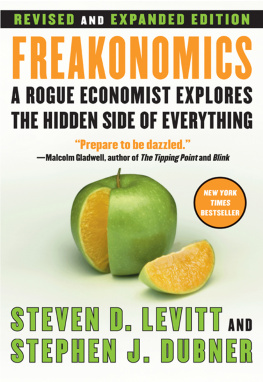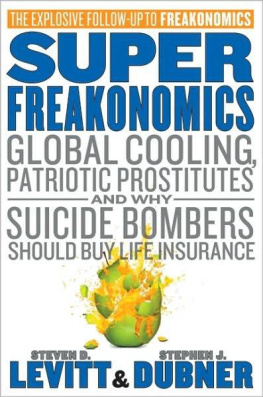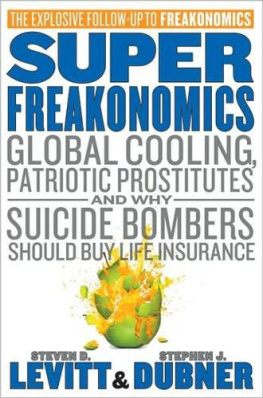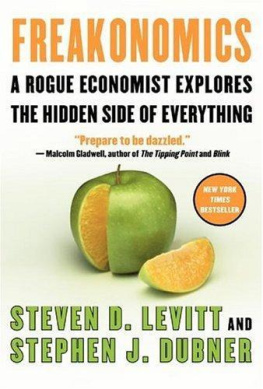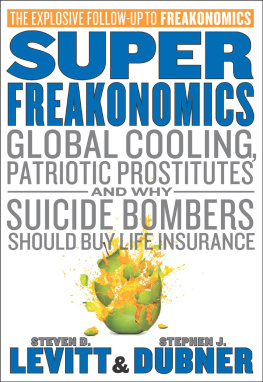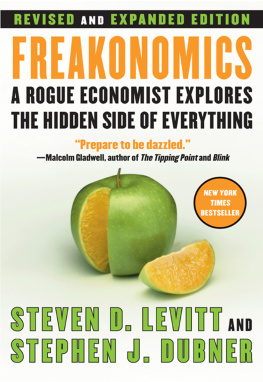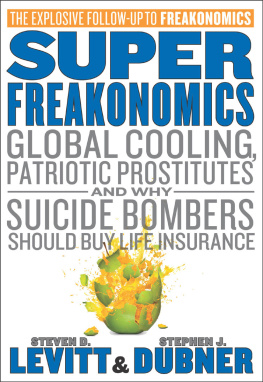Our biggest thanks, as always, go to the amazing people who let us tell their stories in this book and who opened their doors, memories, even their ledgers.
As ever, Suzanne Gluck is our North Star and Henry Ferris has been just the right man for the job. Thanks a million to both of you, and everyone at WME and William Morrow. Also to Alexis Kirschbaum and all the other very good people at Penguin U.K., present and past.
Jonathan Rosen lent another pair of eyesexceedingly perceptive oneswhen they were desperately needed.
Bourree Lam was tireless in research and all-around assistance; Laura L. Griffin was a most excellent fact-checker.
Hey, Harry Walker Agency: you are the greatest!
Special thanks to Erin Robertson and everyone at the Becker Center and the Greatest Good; also to the talented Freakonomics Radio crew: Chris Bannon, Collin Campbell, Gretta Cohn, Andrew Gartrell, Ryan Hagen, David Herman, Diana Huynh, Suzie Lechtenberg, Jeff Mosenkis, Chris Neary, Greg Rosalsky, Molly Webster, Katherine Wells, and everyone else at WNYC.
From SDL: To the people closest to me, thank you for everything; you are better than I deserve.
From SJD: To Anya Dubner and Solomon Dubner and Ellen Dubner: you provide comfort and joy, pirouettes and nutmegs, explosions of love, all the days of my life.
FREAKONOMICS
A Rogue Economist Explores
the Hidden Side of Everything
SUPERFREAKONOMICS
Global Cooling, Patriotic Prostitutes, and
Why Suicide Bombers Should Buy Life Insurance
SUPERFREAKONOMICS
Illustrated Edition
SUPERFREAKONOMICS
The Super-Deluxe, Super-Illustrated Edition
Also by Stephen J. Dubner
TURBULENT SOULS
A Catholic Sons Return to His Jewish Family
also published as
Choosing My Religion: A Memoir of a Family Beyond Belief
CONFESSIONS OF A HERO-WORSHIPER
THE BOY WITH TWO BELLY BUTTONS
Australia
HarperCollins Publishers Australia Pty. Ltd.
Level 13, 201 Elizabeth Street
Sydney, NSW 2000, Australia
www.harpercollins.com.au
Canada
HarperCollins Canada
2 Bloor Street East - 20th Floor
Toronto, ON M4W 1A8, Canada
www.harpercollins.ca
New Zealand
HarperCollins Publishers New Zealand
Unit D1, 63 Apollo Drive
Rosedale 0632
Auckland, New Zealand
www.harpercollins.co.nz
United Kingdom
HarperCollins Publishers Ltd.
1 London Bridge Street
London SE1 9GF, UK
www.harpercollins.co.uk
United States
HarperCollins Publishers Inc.
195 Broadway
New York, NY 10007
www.harpercollins.com
What Does It Mean to Think
Like a Freak?
After writing Freakonomics and SuperFreakonomics, we started to hear from readers with all sorts of questions. Is a college degree still worth it? (Short answer: yes; long answer: also yes.) Is it a good idea to pass along a family business to the next generation? (Sure, if your goal is to kill off the businessfor the data show its generally better to bring in an outside manager.) Whatever happened to the carpal tunnel syndrome epidemic? (Once journalists stopped getting it, they stopped writing about itbut the problem persists, especially among blue-collar workers.)
Some questions were existential: What makes people truly happy? Is income inequality as dangerous as it seems? Would a diet high in omega-3 lead to world peace?
People wanted to know the pros and cons of: autonomous vehicles, breast-feeding, chemotherapy, estate taxes, fracking, lotteries, medicinal prayer, online dating, patent reform, rhino poaching, using an iron off the tee, and virtual currencies. One minute wed get an e-mail asking us to solve the obesity epidemic and then, five minutes later, one urging us to wipe out famine, right now!
Readers seemed to think no riddle was too tricky, no problem too hard, that it couldnt be sorted out. It was as if we owned some proprietary toola Freakonomics forceps, one might imaginethat could be plunged into the body politic to extract some buried wisdom.
If only that were true!
The fact is that solving problems is hard . If a given problem still exists, you can bet that a lot of people have already come along and failed to solve it. Easy problems evaporate; it is the hard ones that linger. Furthermore, it takes a lot of time to track down, organize, and analyze the data to answer even one small question well.
So rather than trying and probably failing to answer most of the questions sent our way, we wondered if it might be better to write a book that can teach anyone to think like a Freak.
What might that look like?
Imagine you are a soccer player, a very fine one, and youve led your nation to the brink of a World Cup championship. All you must do now is make a single penalty kick. The odds are in your favor: roughly 75 percent of penalty kicks at the elite level are successful.
The crowd bellows as you place the ball on the chalked penalty mark. The goal is a mere 12 yards away; it is 8 yards across and 8 feet high.
The goalkeeper stares you down. Once the ball rockets off your boot, it will travel toward him at 80 miles per hour. At such a speed, he can ill afford to wait and see where you kick the ball; he must take a guess and fling his body in that direction. If the keeper guesses wrong, your odds rise to about 90 percent.
The best shot is a kick toward a corner of the goal with enough force that the keeper cannot make the save even if he guesses correctly. But such a shot leaves little margin for error: a slight miskick, and youll miss the goal completely. So you may want to ease up a bit, or aim slightly away from the corneralthough that gives the keeper a better chance if he does guess correctly.
You must also choose between the left corner and the right. If you are a right-footed kicker, as most players are, going left is your strong side. That translates to more power and accuracybut of course the keeper knows this too. Thats why keepers jump toward the kickers left corner 57 percent of the time, and to the right only 41.
So there you standthe crowd in full throat, your heart in hyperspeedpreparing to take this life-changing kick. The eyes of the world are upon you, and the prayers of your nation. If the ball goes in, your name will forever be spoken in the tone reserved for the most beloved saints. If you failwell, better not to think about that.
The options swirl through your head. Strong side or weak? Do you go hard for the corner or play it a bit safe? Have you taken penalty kicks against this keeper beforeand if so, where did you aim? And where did he jump? As you think all this through, you also think about what the keeper is thinking, and you may even think about what the keeper is thinking about what you are thinking.
You know the chance of becoming a hero is about 75 percent, which isnt bad. But wouldnt it be nice to jack up that number? Might there be a better way to think about this problem? What if you could outfox your opponent by thinking beyond the obvious? You know the keeper is optimizing between jumping right and left. But what if... what if... what if you kick neither right nor left? What if you do the silliest thing imaginable and kick into the dead center of the goal?
Yes, that is where the keeper is standing now, but you are pretty sure he will vacate that spot as you begin your kick. Remember what the data say: keepers jump left 57 percent of the time and right 41 percentwhich means they stay in the center only 2 times out of 100. A leaping keeper may of course still stop a ball aimed at the center, but how often can that happen? If only you could see the data on all penalty kicks taken toward the center of the goal!
Okay, we just happen to have that: a kick toward the center, as risky as it may appear, is seven percentage points more likely to succeed than a kick to the corner.
Next page
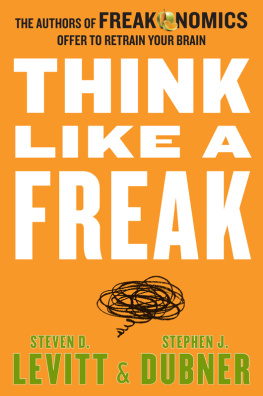
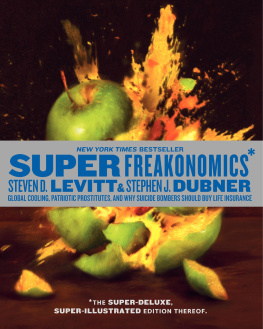
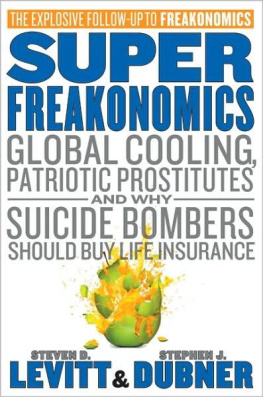
![Dubner Stephen J. - Super freakonomics : [global cooling, patriotic prostitutes and why suicide bombers should buy life insurance]](/uploads/posts/book/76604/thumbs/dubner-stephen-j-super-freakonomics-global.jpg)
